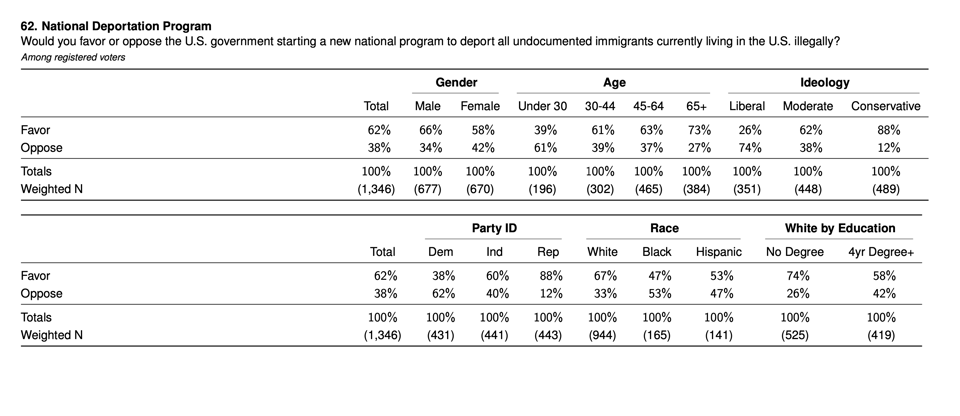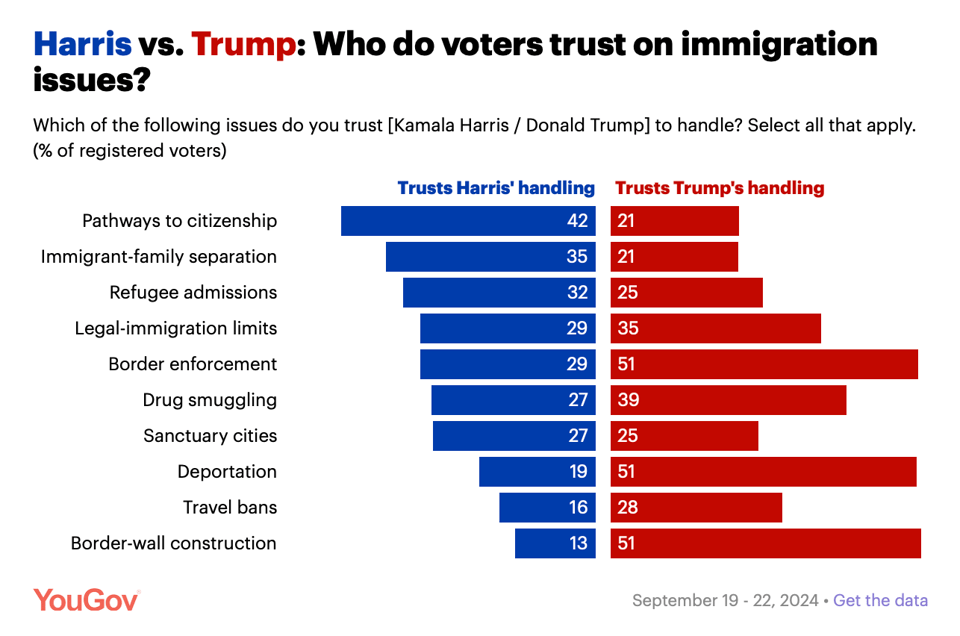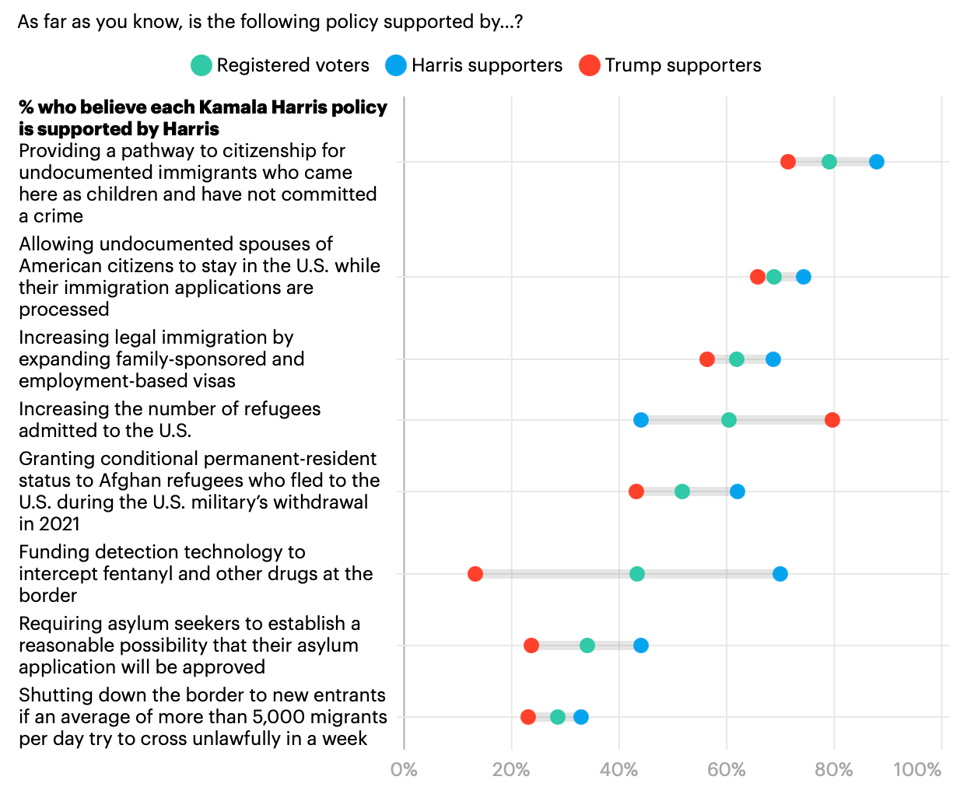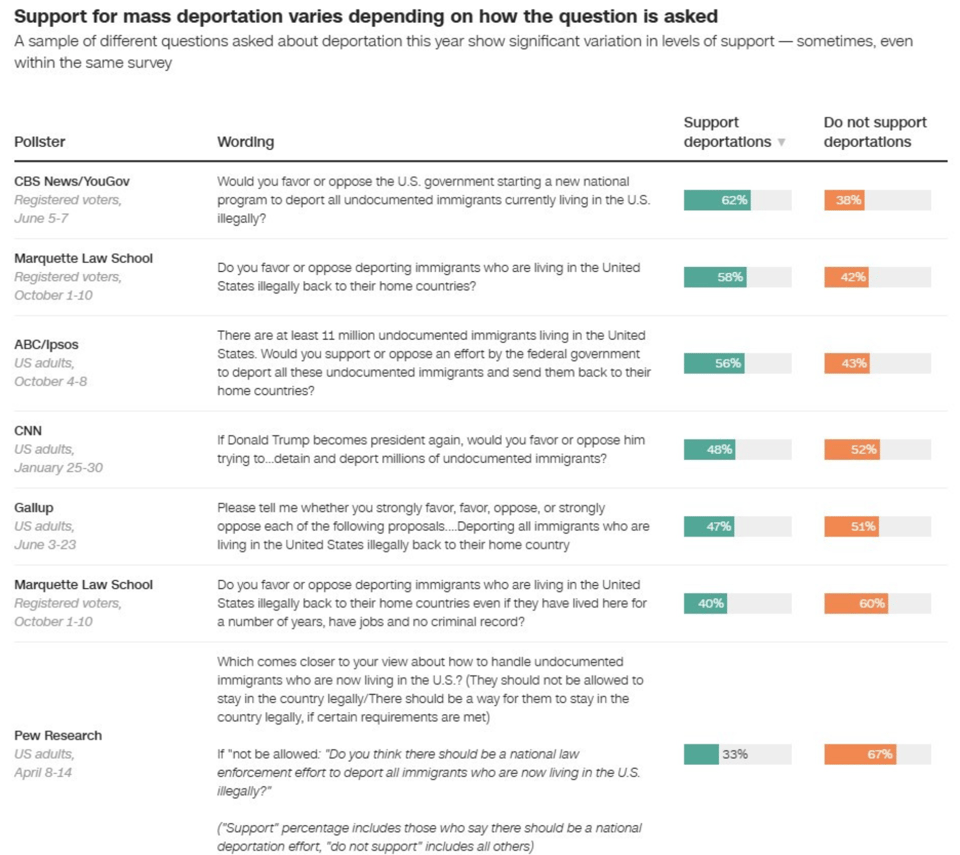How Democrats Can Fight Back Against Mass Deportation
In mid-June of 2024, Newsweek published the article Majority of Hispanics Now Favor Mass Deportation, based on a CBS/YouGov poll of American voters. The survey results were extremely disheartening to pro-immigration supporters overall.

In the Trump era, it's not surprising that 88% of Republicans and 88% of self-identified conservatives favored a national deportation program aimed at undocumented immigrants. What was less expected is that the proposal attracted widespread support from almost every demographic, including 60% of independents, 38% of Democrats, 53% of Hispanics, 47% of Black people, 26% of liberals, and 62% of American registered voters overall.
I think this poll had real-world consequences in the 2024 presidential race by convincing Kamala Harris to move her immigration policies closer to Trump. In June, Biden had signed an executive order in June that capped asylum claims at the border to below 2,500 claims per day, but by August, Kamala pointed to the bipartisan immigration bill that Donald Trump is credited with killing to argue that her border policies would be stricter than under Biden.
Ironically, I think Kamala Harris's pivot rightward on immigration may have hurt her more than it helped her. Harris not only blurred the distinctions between her and Trump on immigration, but she also made immigration more salient, which reduced attention paid to issues more favorable to Democrats (e.g., abortion rights, preserving democracy). I don't think Kamala Harris could have avoided the immigration issue altogether, but she could have addressed the issue in a way that made her sound less inauthentic and more consistent with core Democratic beliefs.
Although YouGov can probably take some of the blame for the panic instilled in Democratic over increasing public support for mass deportation, the polling organization also had more nuanced public opinion data, which tended to get ignored. For example, when voters were asked to say which candidate they trusted the most on different aspects of immigration, Harris earned more trust on some items, while Trump earned more trust on others.

Donald Trump was trusted the most on “border enforcement” (51% Trump vs. 29% Harris), “deportation” (51% Trump vs. 19% Harris), and “border-wall construction” (51% Trump, 13% Harris). By focusing more attention on how she planned to continue and strengthen Joe Biden’s border enforcement policies, Harris unwittingly encouraged voters to evaluate the immigration issue using framings that were more beneficial to Trump. Instead, Harris could have focused on the three immigration policies where voters actually did trust Harris more than Trump: pathways to citizenship (42% Harris vs. Trump 21%), immigrant-family separation (35% Harris vs. Trump 21%), and refugee admissions (32% Harris vs. Trump 25%). Harris tried to outdo the Republicans on tough immigration rhetoric, but voter’s trust in the Democrats was actually strongest for the more humanitarian aspects of immigration policy.
Another problem with Kamala Harris’s attempts to sound more punitive on immigration policy is that voters didn’t believe her. Kamala Harris proposed shutting down the border to new entrants if more than 5000 migrants tried to cross the border unlawfully in the same week, but only 29% of voters actually believed she supported that policy. What's more, less than 40% of Kamala Harris's own supporters believe she supported that policy.
When Kamala Harris came out in favor of funding new detection technologies to intercept fentanyl at the border, about 70% of Harris supporters correctly identified her as supporting that policy, but less than 20% of Trump supporters gave her any credit for that same policy. Overall, 59% of voters thought Harris's fentanyl detection plan was a Trump policy, whereas only 43% of voters thought Harris supported it.

According to a recent article on CNN, support for mass deportation can fluctuate anywhere between 33% and 62% depending on how you ask the question. In the future, I believe that Democrats can exploit this volatility and ambiguity in Americans’ attitudes on deportation to build a new consensus for a more humanitarian immigration policy.

Scholars will definitely have to weigh in with more research, but my initial read of this chart is: (1) support for deportation increases when you use language like "illegally" or "back to their home countries," (2) support decreases if it is specifically tied to Donald Trump, and (3) support also decreases if you include qualifying language that humanizes undocumented immigrants (e.g., "...if they have lived here for a number of years, have jobs and no criminal record"). In addition, the lowest support for deportation came from the Pew Research poll, which forced survey respondents to consider whether there "should be a way for them to stay in the country legally, if certain requirements are met."
Given the anti-incumbent environment in 2024, I don't think I could have created an immigration policy for Kamala Harris that would have guaranteed a better election outcome for her. Besides, it's not productive to focus on what might have been when we have to deal with events now.
Going forward, I think the Democrats need to oppose Donald Trump's immigration policies instead of capitulating to them. Here’s what I would propose.
- Don’t make the immigration policy bipartisan. Tie the policy relentlessly to Trump and use voters’ residual distrust and dislike of Donald Trump to make the policy less popular by association.
- Reduce the criminal stigma applied to undocumented immigrants by proposing streamlined policies that will enable the undocumented to “legalize their paperwork.” Instead of calling it “amnesty,” call it “legalization.”
- Make it clear to the general population that Donald Trump’s policies will hurt “good immigrants,” not just criminals. Use humanizing details about “good immigrants” as much as possible to prevent Trump from talking about “illegal immigrants” as an undifferentiated mass of invaders.
- Challenge any language that refers to immigrants going back to “their home country.” Highlight immigrants who have embraced the United States as their “home country” instead.
If Democrats are willing to fight, I think they can make Trump's mass deportation policies less popular, but first they have to make a decision now that they won't preemptively surrender to him.